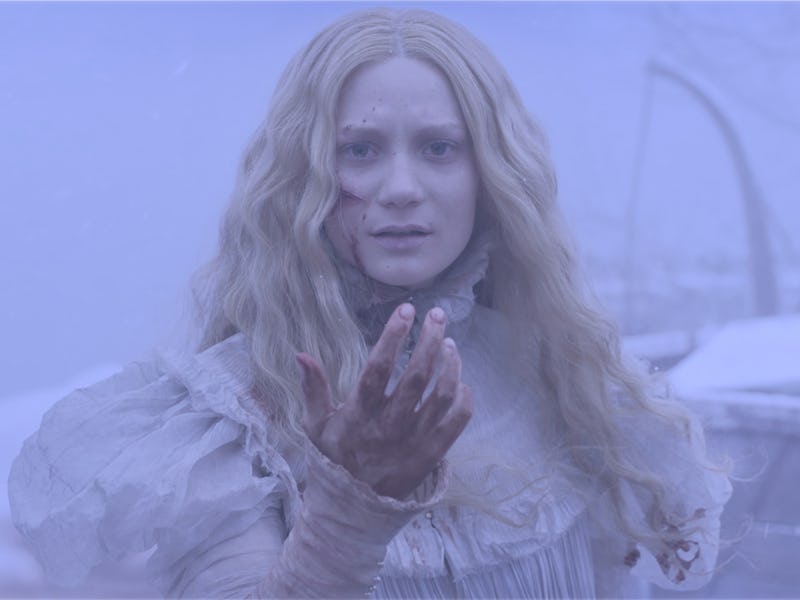'Crimson Peak' Should Get a Sequel
With 'Pacific Rim 2' in a holding pattern, Guillermo del Toro has the time on his hands.

Guillermo del Toro’s Crimson Peak was a gothic delight that fell a little short on characterization but otherwise delivered an elegant, bloodsoaked romp through a truly batty haunted house. Del Toro’s previous film, Pacific Rim, was supposed to have a sequel, but with that delayed — maybe rightfully so — here’s the case for why this del Toro film should have a sequel instead.
The two characters left standing. Spoiler alert, the two people left standing at the end of Crimson Peak are the bookish Edith (Mia Wasikowska) and her childhood pal turned rescuer turned rescue-ee, Dr. Alan McMichael (Charlie Hunnam). And honestly, they’re the film’s most underdeveloped characters — McMichael in particular is written schizophrenically, at turns a nerdy best friend, or a gunslinging badass who solves crimes, believes in ghosts, and walks for hours through blizzards. Edith is a writer of gothic tales who prefers typing her stories — lest her handwriting give her away as woman — but her writing aspirations never go anywhere.
That just means there’s room for expansion. Whether they’re a couple or not is up in the air, but they can be a ghost-hunting duo who kick ass and take names, like some kind of Victorian Bonnie and Clyde. Tell me you wouldn’t watch that.
The house. Allerdale estate, del Toro’s playground for the film, is a glorious Abandoned-Porn masterpiece. The set is painstakingly built — del Toro even installed a real elevator — so why let it go to waste?
The film was partly influenced by Daphne Du Maurier’s Rebecca but Crimson Peak’s ending doesn’t quite pack Rebecca’s punch: “Last night I dreamed I went to Manderley again,” it famously begins after the events of the story, adding, “we can never go back, that much is certain. The past is still too close to us.” The story itself ends with the estate burning:
There to the left of us was the silver streak of the river, widening to the estuary at Kerrith six miles away. The road to Manderley lay ahead. There was no moon. The sky above our heads was inky black. But the sky on the horizon was not dark at all. It was shot with crimson, like a splash of blood. And the ashes blew towards us with the salt wind from the sea.
Rebecca ends ominously, with the main characters still haunted. Crimson Peak ends with Edith and McMichael limping away from Allerdale estate, casting one last glance at it. It’s ambiguous, but the house doesn’t burn as it does in Rebecca, we don’t get a sense that the good guys didn’t truly win and will be forever tormented by their ordeal. What’s a more deliciously Gothic ending than to have the Bad Guys win? The sequel could have Edith and McMichael move into the estate and slowly become infected by the very evil they sought to flee. Both Wasikowska and Hunnam have the skill to play dark — so by all means, let them.
Several plot points are still hanging. Crimson Peak set up a few Chekhov’s guns that it never ended up shooting. Take Thomas Sharpe (Tom Hiddleston) and his mysterious machine that churns around the bloody looking clay, for instance: He tinkers with the damn thing the whole movie.
I expected it to have some nefarious use, like harvesting his dead wives so that he could have eternal youth (what else does a guy use a machine for?) and yet it’s just kind of there; that subplot never develops. Same with the basement dungeon vats of mysterious red sludge — sure, Edith sees a ghost in one, but I expected them to house the bodies of his ex wives a la Bluebeard. These things can be explored in another film. Have a sequel where Edith, like the audience, is tormented by her curiosity, comes back to look at the machine for research for a book she’s working on, and boom, she gets her writing career as the machine gets more exposition.
Crimson Peak is a solid standalone film — as is Pacific Rim — but if you’re going to option just one of del Toro’s works for a sequel, give it to Crimson Peak. Even Charlie Hunnam — the only actor to appear in both films — would agree that Crimson Peak should get a sequel over Pacific Rim.
“I think world creation and monster creation is exciting as a secondary element of storytelling,” he told Entertainment Weekly. “When it becomes more important than storytelling, I get very nervous, and you sort of lose me a little bit. Although we tried very hard on Pacific Rim to marry those two elements, I do feel like ultimately it got weighed heavier on the side of spectacle than storytelling. Not to say I wasn’t proud of the film. But I do feel like we could have maybe plumbed the depths of the character and the storytelling a little bit more.”
He wouldn’t have to worry about that in Crimson Peak 2 if it was about his character being tormented by his dark past while hunting ghosts and slowly succumbing to their evil. Bring it on, del Toro. The story practically writes itself.